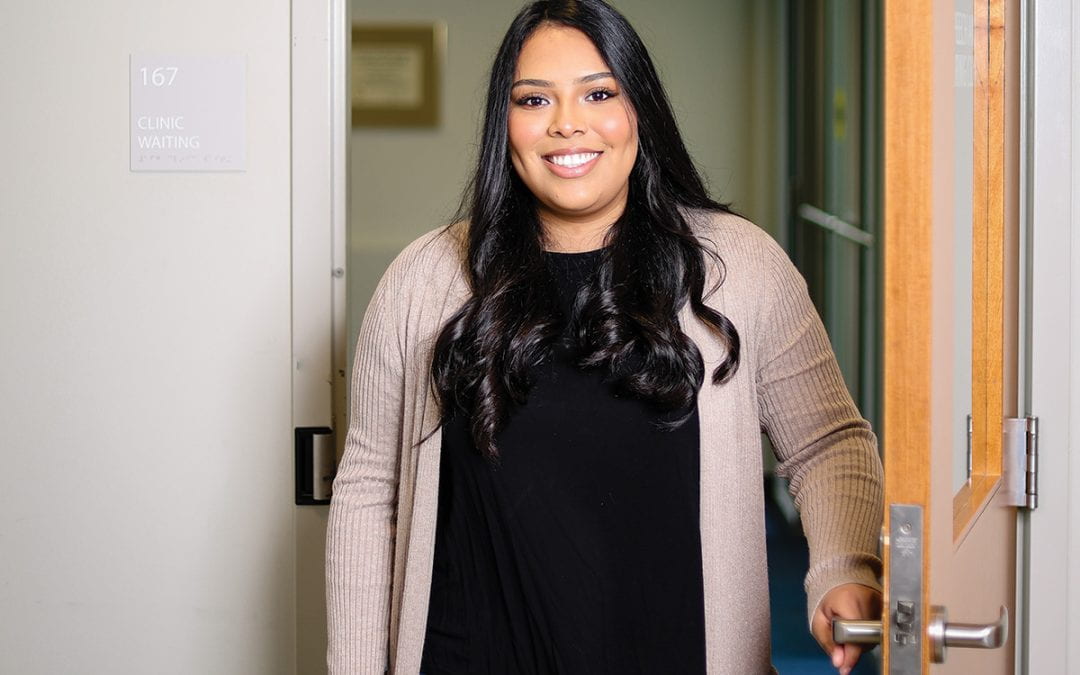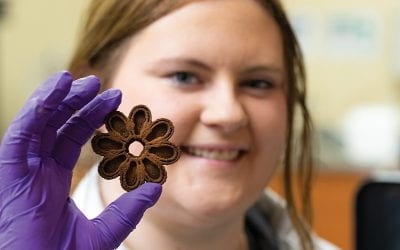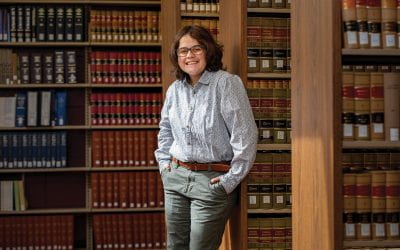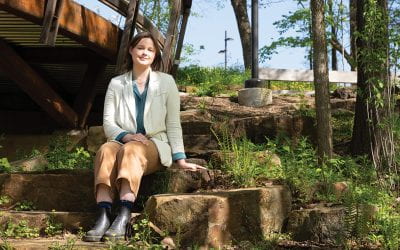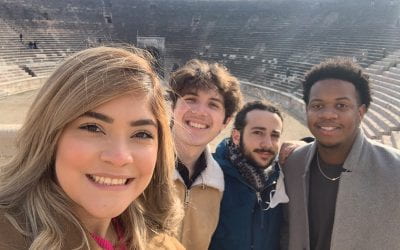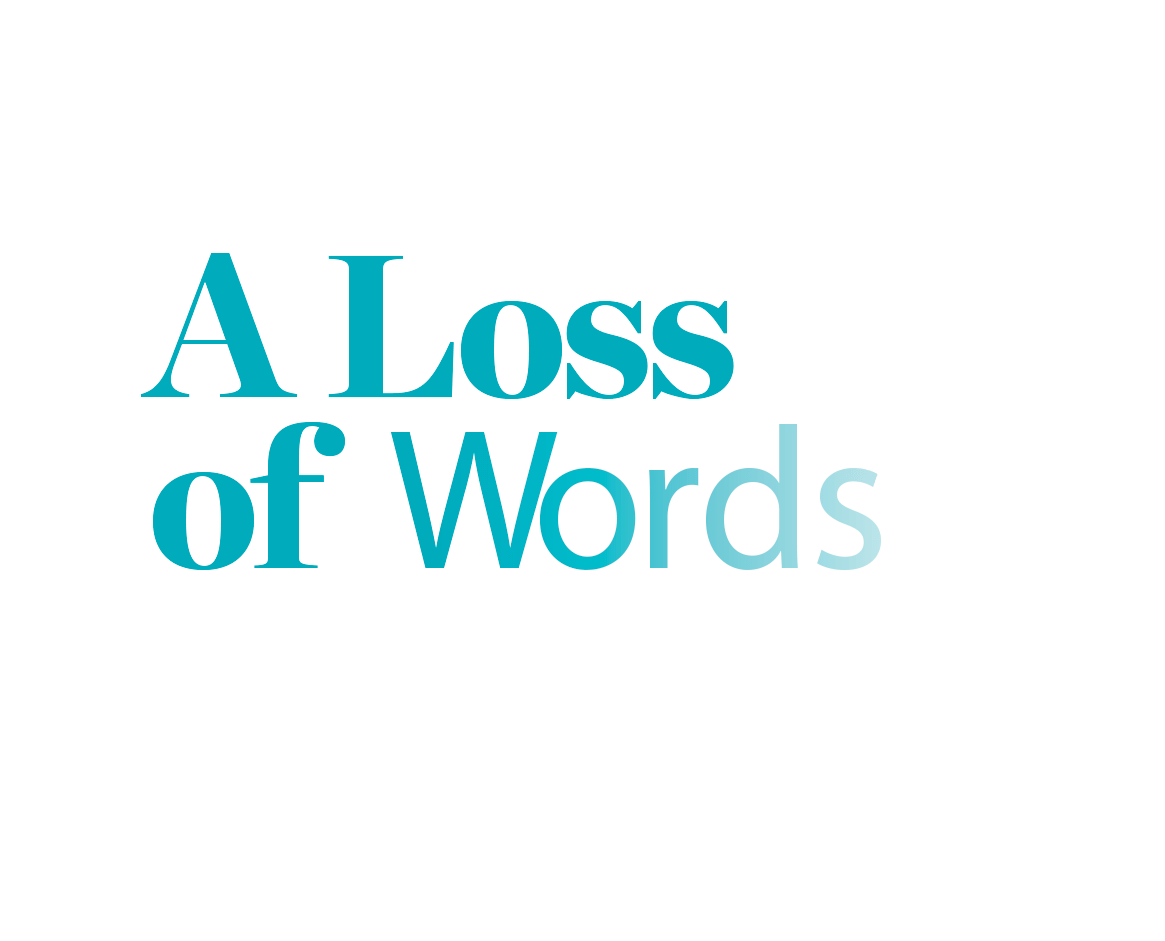
Karina Escobar is continuing her education in communication sciences and disorders and begins her master’s program this fall at the U of A.
By Shelby Gill / Photos by Xavier Smith
Karina Escobar discovered her college major on her 16th birthday, but that wasn’t the plan. The plan was to celebrate with her family and take her driving test. Escobar’s grandmother was visiting from El Salvador for the occasion. Amidst the festivities, her grandmother announced that her tongue was numb. Escobar googled diagnoses and remembers scrolling past the word “stroke” not knowing what it meant.
The next day, Escobar was on the way to take her driving test when her phone rang. The first thing she heard was her mother crying hysterically: Escobar’s grandmother suddenly couldn’t talk. She was shaking, crying and no one could understand the words she was saying. Escobar raced home to take her grandmother to the hospital.
“My grandmother was someone who worked hard her entire life in El Salvador,” Escobar said. “It’s a rough life, and to see her in such a frail position was something so different for me.”
Her grandmother was losing consciousness as they pulled into the hospital. Escobar’s mom threw her the keys to park the car. The preparation for her driving test came in handy.
Escobar’s grandmother recovered from her stroke, but she was in the hospital for more than a month. During her stay, Escobar noticed there were not enough interpreters to serve patients who spoke different languages. Her grandmother’s first language was Spanish.
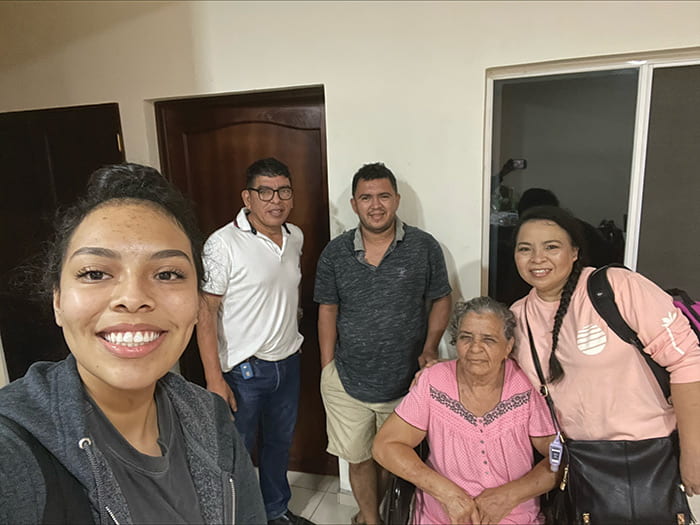
Karina Escobar and family
“My sister and I would switch off the days we were at the hospital,” Escobar remembers. “I missed a lot of school because my family is the priority over everything else. I would stay at the hospital at night so she would have a familiar face when she woke up and someone to talk to.”
While she stayed in the hospital, Escobar met a speech pathologist for the first time.
“She was the light my grandmother needed,” Escobar remembers.
That same day, she met a graduate student from the University of Arkansas who was studying communication disorders and completing her clinicals with her grandmother’s speech pathologist.
“She spoke to me about the program here,” Escobar said. “That’s the day I found out what I wanted to study.”
Escobar had a clear vision for her future: she wanted to work as a speech pathologist in acute care with adults who had suffered strokes, but she needed to find out a way to pay for it.
“I didn’t want to put the financial burden on my parents or take out a loan,” Escobar said. “If I didn’t have financial stability to go to college, I wouldn’t be going at all.”
Escobar was diligent about applying for scholarships to pave the way for her future. In addition to four other scholarships, she was awarded the Path Program scholarship from the Honors College.
“When I found out I got the Path Program scholarship,” Escobar said, “I burst into tears. It has always been my goal to provide funding for myself.”
But the Path Program provided more than funding for Escobar: it gave her opportunities to study abroad, access to peer mentors and the support she needed to thrive in her studies.
More Field Notes
Reducing Waste by Upcycling Misfit Produce
Taylor Clary freeze dries carrots and broccoli donated from local farms to create the mixture, which is extruded from the 3D printer and then baked in an oven to reimagine the produce as a crunchy snack with a longer shelf life. By CD Eskilson / Photos by Russell...
Service-Oriented Software
By CD Eskilson / Photos by Russell Cothren A 2022 report from the Governor’s Food Desert Working Group found that over 20 percent of Arkansas households reported facing some form of food insecurity, exceeding the national average of around 10 percent. Additionally,...
Expanding Equality with Human Rights Frameworks
Expanding Equality with Human Rights Frameworks By CD Eskilson Photos by Russell Cothren In the past decade, countries in Latin America have gained international recognition for working to expand LGBTQ+ rights. From Mexico to Argentina, new laws have passed to...
A Push to Pin Down Safety on the Razorback Greenway
Jessica Shearman likes to walk or ride her bike on the Razorback Greenway, particularly on the section that is close to Dickson Street and the Fayetteville Public Library. There is ample street lighting, and the trail is often busy with other commuters. The Razorback...
Pasta and a Broadening World View
Nayeli Ortiz doesn’t like pasta, but that didn’t stop her from studying abroad for an entire semester in Italy. “Funny story,” Ortiz laughs. “I don’t like pasta. I told myself to be open to new experiences, and every day, I would eat pasta.” While on campus, Ortiz...
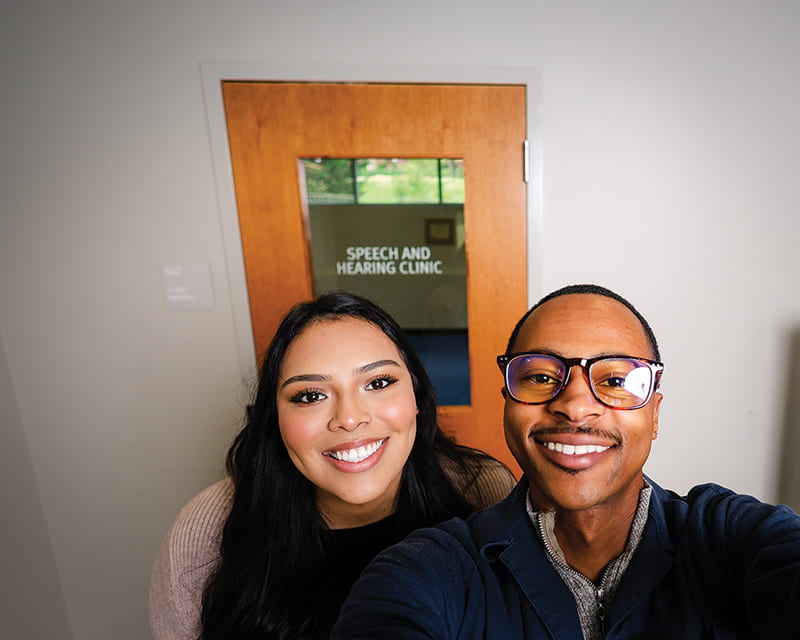
Karina Escobar is a Path Scholar and met her peer mentor Xavier Smith (right) through the program. Smith encouraged her to pursue a double major.
“It has truly been a pleasure to mentor Karina over the years,” said Xavier Smith (B.S., public health, cum laude, ’18), Escobar’s peer mentor, Path alumnus, and now, career counselor at the University of Arkansas Office of Career Connections. “She has exhibited great ambition from her first day on campus, and it has been amazing to support her in achieving every goal she has set for herself.”
After hearing Escobar’s story, Smith encouraged her to pursue a double major in communication sciences and disorders as well as Spanish.
“There’s a very small percentage of bilingual speakers in speech pathology,” Escobar said. “I realized that if I pursued both degrees, I could better serve my patients, and I also have a cultural tie to help people feel more comfortable in a hospital setting.”
Although Escobar is already bilingual, she chose to double major in Spanish so she could understand medical terminology fluently.
Much like how Escobar chose her career path early on, she also met her honors thesis mentor as a freshman. After expressing interest in studying strokes, Escobar was introduced to Mohammad Haghighi, assistant professor of communication sciences and disorders who specializes in aphasia studies. For the last two years, Escobar has observed an aphasia reading club as part of group therapy. The group meets regularly to read, debate and discuss the theme of the assigned reading.
Aphasia is a language disorder that affects a person’s ability to communicate. It affects a person’s ability to express and understand written and spoken language.
“A lot of people have the misconception that just because you have aphasia, you can’t be independent,” Escobar said. “But that’s not true at all. My research studies the impact aphasia has on communication confidence and identity.”
Escobar measured the impact of aphasia by interviewing patients with survey scales and clarifying questions to understand their perceptions on communicative confidence, social relationships and identity. She had to be very thoughtful when designing her survey, so it could be easily accessible to someone who struggled with comprehension and word recollection. In addition to words, Escobar used animations of facial expressions as a visual aid to help participants indicate their response to the question.
“Even beginning my research, I felt like I had my own preconceived biases,” Escobar said. “I thought patients were part of this group for themselves, but what has surprised me is that they go to these groups, so others do not feel alone. I have a participant in my study who is a social butterfly. He simply wants to go to the group meetings to show other people that he struggles as well.”

“My research studies the impact aphasia has on communication confidence and identity.”
The results of Escobar’s research highlighted social relationships as an important aspect of the quality of life for people who experience aphasia. She discovered that group therapy sessions prove to be more beneficial to individuals who have less community in their personal lives. For a participant with a limited personal community, the therapy group provided the main source of interaction and social identity renegotiation.
“The results suggested that people who have not created social groups to foster communication need therapy groups as the key to reaching new milestones,” Escobar added. “Being present in the community or feeling as though one has a footing in the outside world truly helps people with aphasia find their new identity.”
Escobar’s grandmother recovered from her stroke and returned to her home in El Salvador. Escobar starts her Master of Science in Communication Sciences and Disorders at the U of A in the fall. She plans to be a graduate assistant for the Volunteer Action Center and looks to continue her passion for public health and giving back to the community that was inspired and motivated by her grandmother.

